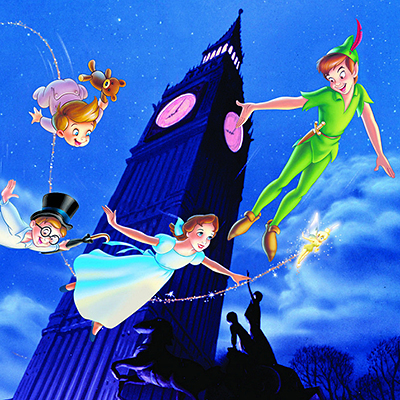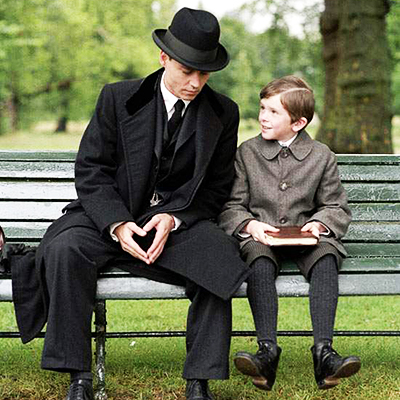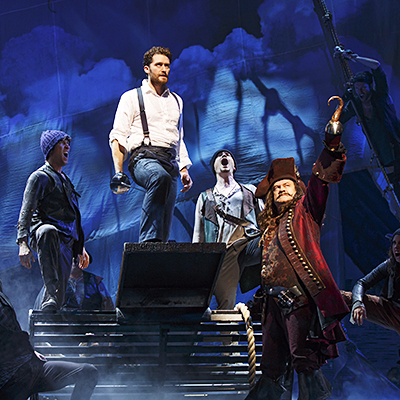Straight on ‘Til Broadway! How Finding Neverland Flew From the Big Screen to the Great White Way
Since J.M. Barrie published Peter Pan in the early 20th century, the boy who never grew up has flown through the imagination of generations of children, along with visions of the Darling children being whisked away to Neverland, the lost boys, pirates and mermaids. It's inspired remakes from the beloved 1953 Disney film to the 1954 Broadway musical smash starring Mary Martin, feature films from Hook and Pan to the recent live Peter Pan TV musical and approximately one million Tinker Bell movies. Now a new generation of children of all ages will hear the story behind the story when the Barrie-based musical Finding Neverland lands on Broadway. Read this bedtime story on the making of the show before the Diane Paulus-helmed musical opens at the Lunt-Fontanne Theatre on April 15.

Baby Barrie
James Matthew Barrie was born in 1860 in Kirriemuir, Scotland, the son of a weaver and the ninth of ten children. The earliest seeds of Peter Pan were planted when he attended Dumfries Academy as a teenager, where he and his friends would play a pirate game that he credited with inspiring his later work. He started his career writing theater reviews, which led him to London and playwriting—he wrote dozens of plays and novels in his life, but none would ever approach the popularity of Pan. A fascination with and love for children permeated his work, which biographers have attributed to the death of his 14-year-old brother David when James was just six years old. His love of children lasted throughout his life and beyond—before his death in 1937 he bequeathed the not-at-all-insignificant rights to all Peter Pan properties to the Great Ormond Street Hospital in London.

Ahoy, Peter!
Peter Pan first appeared in print in 1902, in a novel called The Little White Bird. Barrie first made up the character to entertain the many boys of the Davies family—George, Peter, John and Michael—whom he'd met while walking his Saint Bernard in London's Kensington Gardens. He grew close with the family, especially the boy's mother, Sylvia Llewelyn Davies, and the world of Peter Pan and Neverland grew out of the games Barrie invented to play with the boys. The play Peter Pan premiered in 1904 (and became a novel in 1911); it went to Broadway in 1905, to rapturous reviews. A review published on November 7, 1905 in The New York Times began, "Barrie, the talented father of so many sweet and delicate-mind children, has introduced to us another of his fledglings-Peter Pan by name. Peter Pan isn't a play. It is just a gentle jogging of the memory and a reminiscence of your childhood."

You Can Fly
The 1953 animated Disney film didn't fare quite as well in the Times, "on the ground that it does not hold precisely to the pristine spirit of the J. M. Barrie play," but that didn't stop it from becoming hugely popular, and the highest-grossing film of the year. The stage adaptation, which had music and lyrics from Comden and Green and Jule Styne and was directed and choreographer by Jerome Robbins, was a hit when it opened on Broadway in 1954, earning Tony Awards for both Mary Martin as Peter Pan as Cyril Ritchard as Mr. Darling/Captain Hook.

Up to No Good?
Barrie has long been a subject of fascination and debate—some critics have found his relationship with the Sylvia and the Davies' children a bit, well, creepy; others refute claims of impropriety just as vehemently. Allen Knee, in his 1998 off-Broadway play The Man Who Was Peter Pan, took a flattering look at Barrie and helped matters by having Sylvia's husband Arthur already dead, though in reality he didn't die until 1907 and was alive for all the story's events. Johnny Depp, who starred (with Kate Winslet) in the resulting film adaptation, 2004's Oscar-nominated Finding Neverland, did too. Barrie "only felt comfortable when he was hanging around with kids for the pure reason that there were no ulterior motives," Depp told NPR. "Kids didn't have any agenda... They just behaved and they were pure and honest and he was kind of obsessed with that."

Make It Sing
Harvey Weinstein, who produced the film Finding Neverland, began toying with the idea of having it turned into a musical because it was the only movie his four daughters all adored. In 2012, a version of the musical premiered in Leicester, England, with a book by Knee, music by Scott Frankel and lyrics by Greg Korie, with Rob Ashford on board as director/choreographer. After tepid reviews (Weinstein blames himself for the underwhelming start), beloved British actor, Tony winner and now host of The Late Late Show James Corden suggested to pal Weinstein that UK music star Gary Barlow might be a good fit for a musical do-over, and a whole new show was created.

Pop Appeal
The story of Finding Neverland may begin in 1904, but the Broadway musical has a distinctly modern flavor. "J.M. Barrie was such a revolutionary, he thought different to other writers of his time. So in his head things would have sounded different," says Kennedy. It doesn't hurt that three members of the creative team—composer/lyricists Gary Barlow and Eliot Kennedy and choreographer Mia Michaels—all have serious pop cred. Kennedy has written songs for the like of Bryan Adams and the Spice Girls, Gary Barlow is a member of oh-so-sexy British boy band Take That, and Michaels has won three Emmy Awards for her choreography on So You Think You Can Dance! She'll be right at home working with the young lady playing Peter Pan—Melanie Moore won season eight of the competition series.

Stage Struck
The revamped version of Finding Neverland landed stateside at the American Repertory Theater in Boston in 2014, starring Jeremy Jordan as J.M. Barrie and Laura Michelle Kelly as Sylvia Llewellyn Davies. Director Diane Paulus calls the show "a kind of a soul mate love story," about a beautiful widow, Davies, and blocked writer, Barrie. Kelly has made the move to Broadway with the show, but Tony-nominated Broadway and Glee star Matthew Morrison assumed the role of Barrie. "He's an incredibly tortured man, someone who suffers from severe writer's block, who had a bad childhood that forced him to grow up really fast," Morrison told Broadway.com. "Meeting this family inspired him to help him change his life." Another Tony nominee, Kelsey Grammer, also joined the cast as theater impresario Charles Frohman, who doubles as Captain Hook when the musical flies from reality into Neverland fantasy. "It's so beautiful," Grammer told Broadway.com. "Anything is possible. You can fly. There's nothing like it."